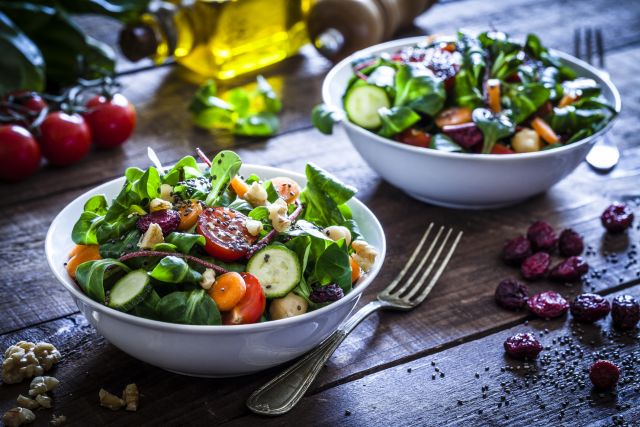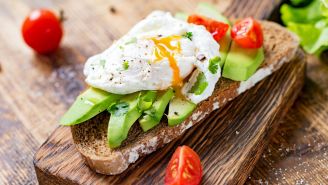Updated on May 26, 2023.
Salad bars can be the source of wholesome, filling meals—or more calories than you might anticipate. It all depends on what you choose to fill your plate and how much of each ingredient you take.
Here's how to make smart selections from one end of the buffet to the other without loading up on unhealthy fats, sodium, sugar, and refined carbs.
When it comes to greens, go dark
Build a vitamin- and fiber-packed foundation for your salad by laying down a bed of spinach or crunchy romaine lettuce. You’ll get at least half of your daily recommended intake of vitamin A and all of your vitamin K.
Skip lighter greens. They tend to offer less nutrition than their dark, leafy counterparts. Iceberg lettuce, for instance, delivers only a fraction of the vitamin A you need, a little bit of vitamin K, and not much else.
Brighten up your veggies
Top your greens with about 1 cup of colorful crudites. Think broccoli, carrots, cherry tomatoes, green and red bell peppers, and beets. Ounce for ounce, vibrant veggies give you more fiber, minerals, vitamins, and disease-fighting antioxidants than their paler companions, like celery and cucumbers.
Skip anything coated in mayo or mystery dressing, such as carrot-and-raisin mixes, coleslaw, and potato salad.
Choose lean proteins
Aim for about 1/2 cup of lean animal or vegetable-based proteins. Chickpeas and kidney beans are nifty sources of fat-free protein (6 grams each per half cup). Sliced hard-boiled eggs (8 grams) are another smart choice; just limit the yolk as much as possible to help reduce fat.
Skip chicken, tuna, or crab salads. They're usually made with high-fat mayo. Three-bean salad sounds healthy, but is typically afloat in a sea of oil. Cottage cheese also has that health-food aura, but is often high in artery-clogging saturated fat.
Sprinkle on extra flavor and crunch
Like a little cheese? Add 1 tablespoon of Parmesan (22 calories) to punch up the flavor. Looking for a little texture? A tablespoon of chopped walnuts or sunflower seeds lend some healthy crunch. Like all nuts and seeds, they bring heart-healthy fats that help your body absorb the nutrients in all those veggies.
Skip cubed or shredded cheese cubes. Just a few and the additonal fat and calories begin to add up. Croutons, meanwhile, may look light and airy, but they offer only empty refined-carb calories (100 per 1/4 cup), plus sodium and fat. The same goes for crunchy Asian noodles.
Dress for success
Next, swirl on about 1 tablespoon of heart-healthy olive oil, a splash of vinegar, a few grinds of fresh pepper, and toss well. Thorough tossing ensures that all the flavors and textures are evenly distributed and lets you use minimal dressing to maximum effect.
Skip those vats of ready-made salad dressings. The creamy varieties in particular can quickly push your salad into fast-food territory in terms of sodium, saturated fat, and calories. The low-fat or fat-free versions may sound healthier, but even those are often loaded with salt, sugar, and additives.
Prefer a fruit salad?
Go for whatever's fresh—whether melons, berries, pineapple, citrus, or kiwi—and top with 1 to 2 tablespoons of chopped walnuts or sunflower seeds for some healthy fats and crunchy flavor. Then add a dollop of low- or no-fat Greek yogurt for creamy protein minus the saturated fat you find in full-fat dairy.
Skip syrupy canned peaches, apricots, pears, and the like. They have far more calories and fewer nutrients than fresh fruit.






